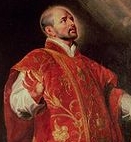April 4: Ignatius of Loyola, First Jesuit
Ignatius of Loyola Elected to Lead Jesuits (1540)
It was on this date, April 4, 1540, that 50-year-old Spanish ecclesiastic and mystic Ignatius, of the Basque city of Loyola, was elected the first General of the Jesuits, a Society he had Pope Paul III authorize that same year. Born into a noble family in about 1491, Íñigo of Loyola became a knight for Spain but, in his 30th year (1521), he became seriously wounded at the Battle of Pamplona. Íñigo had been, according to a contemporary, “prone to quarrels and amatory folly.” But lame men do not wisely pick quarrels and maids do not offer smiles to lame men, as one biographer quipped.* So, with he help of seclusion in a cave and a copy of “The Lives of the Saints,” Íñigo was converted – calling himself thereafter Ignatius.
His new career did not require his body to be whole and healthy, but it did require an education he lacked: he spoke only Basque and Spanish and was barely literate. One further handicap, in this age of immorality: Ignatius really was chaste and holy. This nearly got him beaten to death when he suggested the nuns give up their lovers and the Rector of Paris University ordered him to be flogged in public. Ignatius traveled on spiritual missions of such eccentricity that the Inquisition imprisoned him briefly in Spain in 1526. Regarded as an obnoxious fanatic wherever he went – because he was actually trying to imitate Christ – he gathered only a handful of followers by the time he finally got to Rome.
In Paris, Ignatius began to surround himself with a secret society of followers, but pretended to serve the poor in order to cultivate the rich. “Let us avoid all relations with women,” Ignatius said, “except those of the highest rank.” Although such reformers as there were within the Catholic Church wanted to suppress Orders, not increase them, through his soon-to-be notorious intrigue, Ignatius got his Society of Jesus recognized by the Pope in 1540 – expressly to fight heresy.
The Jesuits instead meddled in politics so despicably that they were expelled from country after country – banned in England in 1604, expelled from Russia in 1719, expelled from Spain, Parma, and the Two Sicilies in 1767. Before Clement XIV suppressed the Society in 1773, other popes condemned their practices (1710, 1715, 1742, and 1744). The Society was restored following the fall of Napoleon.
The chief Jesuit achievement to that time seems to have been inciting the Thirty Years War (1618-1648). In France, the Jesuit Father Manares “discovered” (that is, fabricated) a plot of the Huguenots, which prepared the way for the St. Bartholomew Massacre. Ignatius did not live to see that triumph, over which the Pope struck a medal of commemoration, having died on 31 July 1556. He was beatified by Pope Paul V in 1609 and canonized by Pope Gregory XV in 1622.
It is true that, as historian Joseph McCabe writes, “no Jesuit theologian ever explicitly wrote that the end justifies the means” – a charge first leveled in Pascal’s Provincial Letters (1656). But the modus operandi of the Society of Jesus, and their “Jesuitry,” has always been such, so it is immaterial whether Ignatius, or the Society of Jesus, ever publicly expressed the thought.
* Joseph McCabe, The Jesuits: Religious Rogues, pamphlet known as Little Blue Book #1144, 1927, collected as Chapter 29 in The Story of Religious Controversy, 1929.
Originally published April 2011 by Ronald Bruce Meyer.


